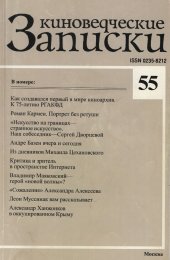 |
 |
ARCHIVES
TO THE 75TH ANNIVERSARY OF RGAKFD
(Russian State Archive of Cinema and Photo-documents) Alexander DERYABIN. Time to collect. Russian cinema and foundation of the world’s first film archive.
S u p p l e m e n t:
Documents pertain to the history of RGAKFD.
Why were a number of films shot in Russia in 1900–1920 lost? Why were only those documentaries, which had been kept in the archives, preserved and whу lots of it partly destroyed? Author states that without the history of losses and distortions in Russian filmotheques true history of Russian cinema cannot be written. Author tells about conditions under these archives were created. Today these archives known as Russian State Archive of Cinema and Photo-documents celebrate the 75th anniversary.
The article is supplemented with documents, pertaining to the evolution period of RGAKFD, unknown before.
PERSONALIA
Valery KHOMENKO. Roman Karmen: a director, a pedagogue, a person. Memoirs without retouch.
One of the classics of Russian cinema, documentary film maker Roman Karmen (1906–1978)
is rather a complicated personality. The memoirs of one of his disciples testify to that fact. They also raise “damned” questions of documentary cinema: to what extent is it possible to mise en scene documentaries and where is the border line separated sympathizing to their heroes from the director’s violence towards them? To what extent does documentary cinema register the reality and to what extent does it predetermine it? How did the state policy of sticks and carrots influence on documentary film making? COLLOQUY
Sergei DVORTSEVOY: «It’s time of documentary cinema in Russia now, not feature».
Documentary films by Sergei Dvortsevoy are awarded on many international festivals but they are frantic discussed in Russia. In interview the director argues about essence of his profession. Responding his critics he accidentally polemizes with Roman Karmen‘s methods of work.
THEME FOR EXPLORATION
Sergei KAPTEREV. Is Vladimir Mayakovsky a hero of nouvelle vague?
At one time “Breathless” by Jean-Luc Godard was taken as sudden turning point in development of film language. Today film attracts first of all by rare formal sharpness but there are other things. The main character of the film Michelle Poucair has a likeness to the great Russian poet Vladimir Mayakovsky, to idea he was for directors of nouvelle vague, author persuades.
FROM THE HISTORY OF FILM THOUGHT
Moussinac is telling you.
The epoch he was formed as critic and citizen is reconstructed by famous French film critic, historian and theorist Leon Moussinac in his memoirs.
Andre BAZIN. A little film diary (a sight from Tourettes-sur Loup).
First published in “Cahier du cinйma” in 1954 this essay helps Russian reader to form a notion about outstanding French film theorist, critic and journalist.
Peter MATTHEWS. Diving the real. Andre Bazin yesterday and today.
Andre Bazin is the single thinker most responsible for bestowing on cinema the prestige both of an artform and of an object of knowledge. It’s time he was rehabilitated from postmodern sneers, argues author.
THEORY
Sergei FILIPPOV. Two aspects of film language and two trends in development of cinema (prolegomena to film history).
This is the 2nd part of theoretical research devoted to the problems of film language (the 1st part published in KZ, № 54). Analyzing the evolution of film language in 1950es–60es author tries to determine the line that the world cinema passed and found itself in crisis. He also suppose regeneration of the cinema will happens because of new technologies.
PROCESS: PROBLEM AND REFLECTIONS
Alexei DUBINSKY. Critique and spectator in Internet space.
Alongside to “paper” film press a new, unexplored phenomenon has been existing for a few years. Author tries to comprehend it analyzing different movie web-sites. He hopes that new kind of critique in Internet will be fruitful trend and probably becomes the condition of existence of cinema as an art in future.
CINEMA: LIFE AND ADVENTURES
The breath of the will. Diaries by Mikhail TSEKHANOVSKY.
The following publication of noted Russian animator’s diaries. The process of work on the films “Pacifik 231” and “Gopak” and unrealized conceptions are described in his notes of 1930–31.
THE RUSSIAN EMIGRATION AND CINEMA
Alexander ALEKSEYEV. Oblivion, or Remorse. Remembrance of the St Petersburg’s cadet.
The chapter “Sources” of the outstanding Russian animator Alexander Alekseyev’s autobiography tells about his schooling years in cadets’ corps in St Petersburg. The beginning of publication is in KZ, № 52.
RESEARCH
Rashit YANGIROV. To biography of A.Khanzhonkov: a new angle.
А. VLADIMIROV. The father of Russian cinema («A voice of the Crimea», 1942).
Dramatic fate of Alexander Khanzhonkov (1877–1945) draws attention of film historics and film makers constantly. Yet many its circumstances are still forgotten, unclear or unknown at all. The article that found recently at Slavonic library in Prague throws a new light on the last days of Alexander Khanzhonkov. It was written down on the words of Khanzhonkov and published in 1942. |
|
 |
||||||||||||||||||||||||||||||||||||||||||||||||||||||||||||||||||||||||||||||||||||||||||||||||||||||||||
| « | » |
является незаконным.



